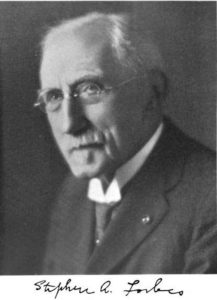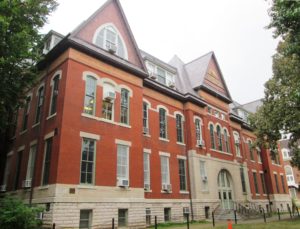In my generation of fisheries biologists, we were all required to read the 1887 paper, The Lake as a Microcosm. The paper was an early expression of ecological principles—the relationship of organisms to their habitat, the cascading of the food chain, the role of birth rates and death rates in maintaining populations. The author was Stephen A. Forbes, the father of aquatic ecology.
Stephen Alfred Forbes was born on May 29, 1844, in Silver Creek, a small town in far northwestern Illinois. He was the son of a farmer, who died when Forbes was just ten years old. The family was supported thereafter by Forbes’ older brother, who eventually sold the farm to keep the family out of poverty.
When he was 16, Forbes joined the northern army to fight in the Civil War. Though hardly more than a boy, he rose rapidly to the rank of captain. He was captured by the confederacy and held as a prisoner of war for six months. When he was discharged at the end of the war, he attended medical school, but never completed his degree (put off, it is said, by the need to perform surgery without anesthetics). Instead, he taught school and devoted himself to the study of nature, always his fundamental interest.

In 1872, he took a job as curator of the Illinois Natural History Museum in Bloomington, Illinois. When the museum was transferred to the state government five years later, he became its director. During this time, Forbes wrote actively for scientific journals about the natural history of his home state, including some of the earliest descriptions of aquatic invertebrates and an ongoing survey of the biology of the Illinois River. In all, Forbes published more than 500 articles about natural history.
When the museum was renamed the Illinois Natural History Survey and moved to Champaign-Urbana, Forbes moved with it. He was also named the state entomologist and became a professor at the University of Illinois—all without any degrees. That deficiency was corrected in 1884, when the University of Indiana awarded him a doctorate in zoology. Forbes eventually rose to Director of the Illinois Natural History Survey, from 1917 until his death in 1930.

He was an able administrator, but his great skill was in the field and laboratory. He reveled in the waters and fields of Illinois and throughout the country. His capacity for observation led him to understand what few had grasped at the time—nature was a vast complex of relationships among species and their habitats, a “community” and an ecosystem. The Lake as a Microcosm is a classic because it lays out so many principles of ecology with both scientific accuracy and elegant prose. Two excerpts demonstrate his understanding.
“If one wishes to become acquainted with the black bass, for example, he will learn but little if he limits himself to that species. He must evidently study also the species upon which it depends for its existence, and the various conditions upon which these depend. He must likewise study the species with which it comes in competition, and the entire system of conditions affecting their prosperity, and by the time he has studied all these sufficiently he will find that he has run through the whole complicated mechanism of the aquatic life of the locality, both animal and vegetable, of which his species forms but a single element.
It is a self-evident proposition that a species cannot maintain itself continuously, year after year, unless its birth-rate at least equals its death-rate. If it is preyed upon by another species, it must produce regularly an excess of individuals for destruction, or else it must certainly dwindle and disappear. On the other hand, the dependent species evidently must not appropriate, on an average, any more than the surplus and excess of individuals upon which it preys, for if it does so, it will regularly diminish its own food supply, and thus indirectly, but surely, exterminate itself.”
Stephen Forbes presided over an era of massive change in the way science considered natural history. When he began his career, natural history was about collecting artifacts—unusual objects, beautiful specimens of birds, shells and rocks, and exotic species from foreign lands. Then Forbes and others began seeking to understand the processes that produced such beautiful and wonderful plants and animals. Then they began using those processes to improve the human condition through agricultural techniques and natural preservation. And by the time of his death in 1930, natural history had become the science of ecology.
References:
Encyclopedia.com. Forbes, Stephen Alfred (1844-1930) American Entomologist And Naturalist. Available at: https://www.encyclopedia.com/history/historians-and-chronicles/historians-miscellaneous-biographies/stephen-alfred-forbes. Accessed May 29, 2018.
Forbes, Stephen A. 1887. The Lake as a Microcosm. Bulletin of the Scientific Association (Peoria, Illinois) 1887:77-87. Available at: http://people.wku.edu/charles.smith/biogeog/FORB1887.htm. Accessed May 29, 2018.
Howard, L. O. 1931. Biographical Memoir of Stephen Alfred Forbes, 1844-1930. National Academy of Sciences, Biographical Memoirs, Volume XV. Available at: http://www.nasonline.org/publications/biographical-memoirs/memoir-pdfs/forbes-stephen.pdf. Accessed May 29, 2018.
